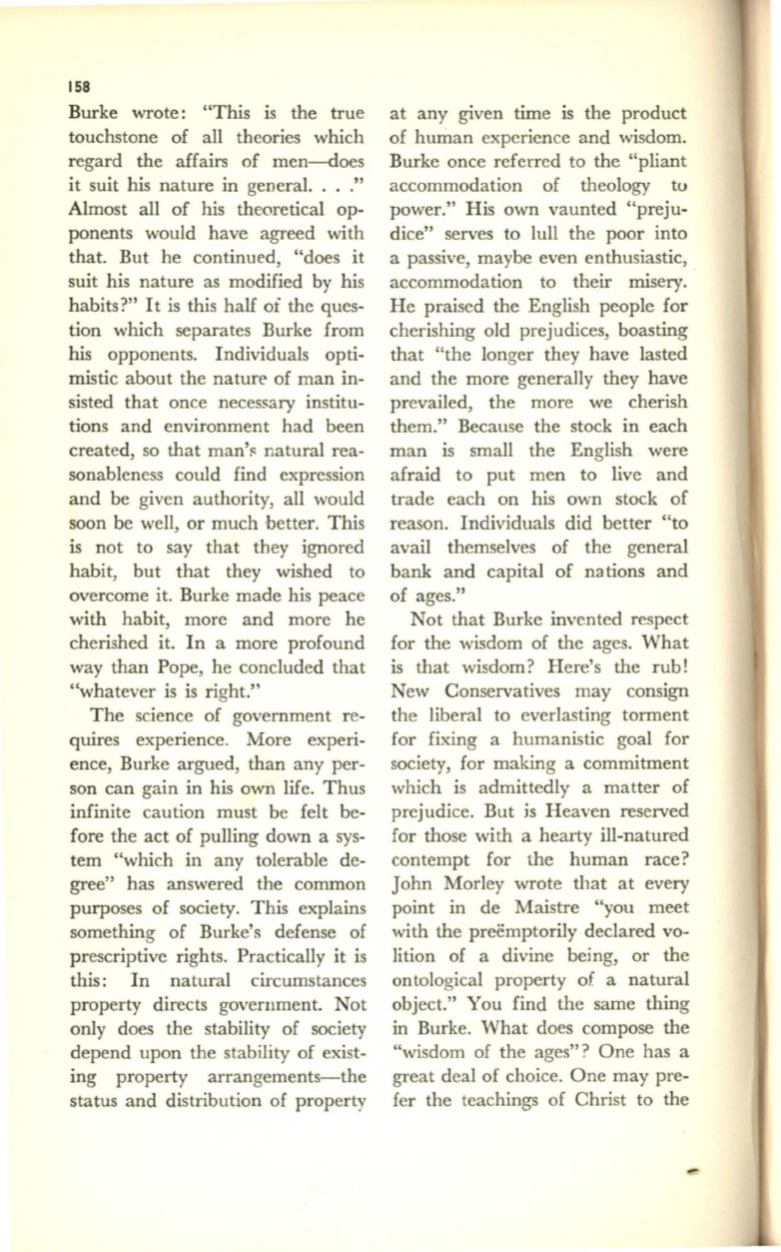
158
Burke wrote: "This is the true
touchstone of all theories which
regard the affairs of men-does
it suit his nature in general. ..."
Almost all of his theoretical op–
ponents would have agreed with
that. But he continued, "does it
suit his nature as modified by his
habits?" It is this half of the ques–
tion which separates Burke from
his opponents. Individuals opti–
mistic about the nature of man in–
sisted that once necessary institu–
tions and environment had been
created, so that
man'~
natural rea–
sonableness could find expression
and be given authority, all would
soon be well, or much better. This
is not to say that they ignored
habit, but that they wished to
overcome it. Burke made his peace
with habit, more and more he
cherished it. In a more profound
way than Pope, he concluded that
"whatever is is right."
The science of government re–
quires experience. More experi–
ence, Burke argued, than any per–
son can gain in his own life. Thus
infinite caution must be felt be–
fore the act of pulling down a sys–
tem "which in any tolerable de–
gree" has answered the common
purposes of society. This explains
something of Burke's defense of
prescriptive rights. Practically it is
this: In natural circumstances
property directs government. Not
only does the stability of society
depend upon the stability of exist–
ing property arrangements-the
status and distribution of property
at any given time is the product
of human experience and wisdom.
Burke once referred to the "pliant
accommodation of theology to
power." His own vaunted "preju–
dice" serves to lull the poor into
a passive, maybe even enthusiastic,
accommodation to their misery.
He praised the English people for
cherishing old prejudices, boasting
that "the longer they have lasted
and the more generally they have
prevailed, the more we cherish
them." Because the stock in each
man is small the English were
afraid to put men to live and
trade each on his own stock of
reason. Individuals did better "to
avail themselves of the general
bank and capital of nations and
of ages."
Not that Burke invented respect
for the wisdom of the ages. What
is that wisdom? Here's the rub!
New Conservatives may consign
the liberal to everlasting torment
for fixing a humanistic goal for
society, for making a commitment
which is admittedly a matter of
prejudice. But is Heaven reserved
for those with a hearty ill-natured
contempt for the human race?
John Morley wrote that at every
point in de Maistre "you meet
with the preemptorily declared vo–
lition of a divine being, or the
ontological property of a natural
object." You find the same thing
in Burke. What does compose the
"wisdom of the ages"? One has a
great deal of choice. One may pre–
fer the teachings of Christ to the


